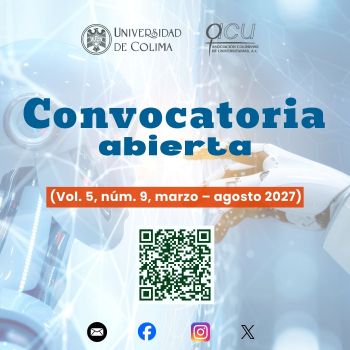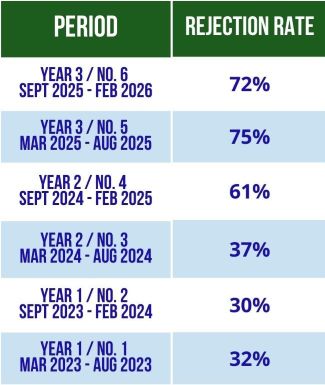Happy memories of past glories at Maria de los Angeles Grant Munive.
A daily life course
Keywords:
life course, trajectories, transitions, Grant Munive, TlaxcoAbstract
This article explains with the life course methodology the individual and family interconnection in the historical context of the first Tlaxcala’s woman with popular representation in public offices in the state and federal congresses: María de los Angeles Grant Munive. The course of life methodology is used to analyze the life trajectories of people, transitions and inflection points that represented brakes in their life process and redefined new continuities of a positive and resilient nature. The main findings are the influence of place in the formation and trajectory of this person, with the impulse of contextual forces such as education, family support, loyalty, respect, solidarity, friendship, and self-complacency of the territory where Mrs. Grant was born and developed her life course. There is a women’s reposition but also a forgetfulness of those that marked a milestone in the public history of the peoples. This space presents the successful way of life of someone who offers a testimony of her happy and unhappy memories, but in the end, her well-earned past glories.
Downloads
Metrics
References
Bailey, A. (2009). Population geography: lifecourse matters, Progress in Human Geography, Londres: Sage Publications.
Blanco, M. (2011). El enfoque del curso de vida: orígenes y desarrollo. En Revista Latinoamericana de Población, Asociación Latinoamericana de Población Buenos Aires, Organismo Internacional, Argentina, vol. 5, 8, pp. 5 - 31.
Bourdieu, P. (2001ª). El campo político. La Paz: Plural.
Bozzano, H. (2000). Territorios reales, territorios pensados, territorios posibles: aportes para una teoría territorial del ambiente. Buenos Aires Argentina: Espacio Editorial.
Camp, R. (1998). Women and Men, Men and Women: Gender Patterns in Mexican Politics. En: Victoria E. Rodríguez (ed.). Women’s Participation in Mexican Political Life, pp. 167-178.
Camp, R. (1996). Reclutamiento político en México, 1984-1991. México: Fondo de Cultura Económica.
Camp, R. (1981). La formación de un gobernante. La socialización de los líderes políticos en el México Posrevolucionario (trad. de Roberto Reyes Mazzoni), 1era. Edición. México: Fondo de Cultura Económica.
Clausen, J. (1998). Life reviews and life stories. En: Janet Giele y Glen Elder (eds.), Methods of Life Course Research. Qualitative and Quantitative Approaches (pp. 191-212) Thousand Oaks (California): Sage Publications.
Elder, G. y Giele, J. (2009). The Craft of Life Course Research. Nueva York: The Guilford Press.
Elder, G.; Kirkpatrick, M. y Crosnoe, R. (2006). The emergence and development of life course theory. En: Jeylan T. Mortimer y Michael J. Shanahan (eds.), Handbook of the Life Course (pp. 5-19) Nueva York: Springer.
Elder, G. (2003). Work in Lives: the interplay of project and biography. En: A. Bolder y A. Witzel (eds.), Berufsbiographien: beitrage zu theorie und empirie ihrer bedingungen, genese und gestaltung (pp. 107-129). Opladen: Leske y Budrich.
Elder, G. (1991). Lives and social change. En: Walter Heinz (ed.), Theoretical Advances in Life Course Research. Status Passages and the Life Course (pp. 87-114). vol. I, Weinheim: Deutscher Studien Verlag.
George, L. (2006). Life Course Research. En: Jeylan T. Mortimer y Michael J. Shanahan (eds.), Handbook of the Life Course (pp. 3-19). Nueva York: Springer.
Giele, J. (1998). Innovation in the Typical Life Course. En: Janet Giele y Glen Elder (eds.), Methods of Life Course Research. Qualitative and Quantitative Approaches (pp. 152-181) Thousand Oaks (California): Sage Publications.
Hägerstrand, T. (1970). What about people in regional science? En: Papers of the regional Science Association. vol. 24, pp. 7-21.
Hernández, R. (1997). Los grupos políticos en México. Una revisión teórica. En: Revista Estudios Sociológicos, 45, pp. 691-739.
Hiernaux, D. y Lindon, A. (2006). Tratado de Geografía Humana, UAM, Iztapalapa. México: Anthropos.
Instituto Nacional de Estadística y Geografía (2015). Encuesta Intercensal 2015, México: INEGI
Instituto Nacional de Estadística y Geografía (1970). IX Censo General de Población 1970, México: INEGI
Instituto Nacional de Estadística y Geografía (1950). Séptimo Censo General de Población 1950, Tabulados básicos, México: INEGI
Labasse, J. (1973). La organización del espacio: elementos de geografía aplicada. Madrid, España: Instituto de Estudios de Administración Local.
Lefebvre, H. (1974). La producción del espacio. Madrid, España: Capitán Swing.
Lynch, G. y Oddone, M. J. (2017). La percepción de la muerte en el curso de la vida. Un estudio del papel de la muerte en los cambios y eventos biográficos. En: Revista de Ciencias Sociales, 30, 40, pp. 129-150.
Caballero, M. y García, P. (2007). Curso de vida y trayectorias de mujeres profesionistas. México: El Colegio de México.
Martínez, G. (2014). “Chiapas: cambio social, migración y curso de vida”. En: Revista Mexicana de Sociología, 76, 3, pp. 347-382.
Palma, E. (2016). Acortando la brecha de género: un análisis de los perfiles de las diputadas en México de las LXI y LXII legislaturas. En: Revista de Estudios Políticos, 38, pp. 57-88.
Palma E. y Cerva D. (2014). La importancia de las instituciones y la organización de las mujeres. El cumplimiento de la cuota de género en las elecciones federales mexicanas de 2012. En: Revista Política y Gobierno, vol. XXI, 2, pp. 291-325.
Rodríguez, V. (1999). Las mujeres y el cambio político en México. En: Revista de Estudios de Género La Ventana, 10, pp. 50-83.
Rowe J. y Kahn R. (1997). Envejecimiento Exitoso. En: The Cerontologist, 37, 4, pp. 433-440.
Urbano, C. y Yuni, J. (2005). Psicología del desarrollo: Enfoques y perspectivas del Curso Vital, Argentina: Brujas.
Weber, M. (1998). La política como vocación. En: R. Aron, (ed.), El político y el científico (pp. 10-25). Madrid, Alianza.
Weber, M. (1982). Escritos políticos, Ciencia Política. Alianza Editorial: Madrid, España.
Downloads
Published
How to Cite
Issue
Section
License

This work is licensed under a Creative Commons Attribution-NonCommercial-ShareAlike 4.0 International License.
GénEroos Magazine allows you to share, copy and redistribute the material in any medium or format; adapt, remix, transform and build upon the material, crediting the work appropriately and providing a link to the licence, indicating if changes have been made.








